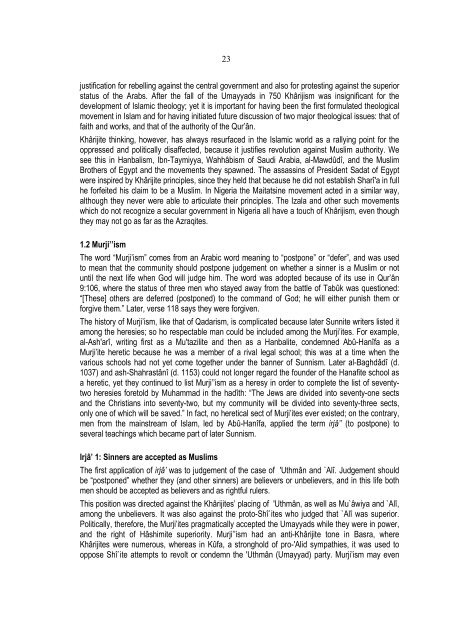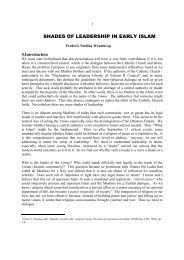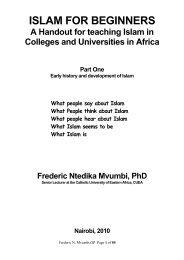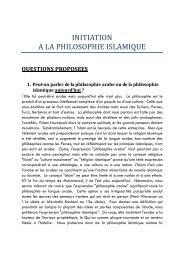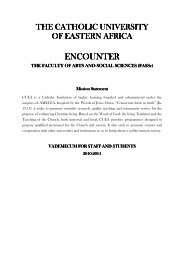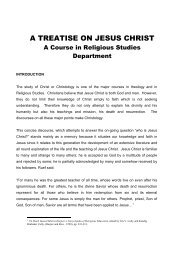INTRODUCTION TO ISLAMIC THEOLOGY.pdf - CUEA
INTRODUCTION TO ISLAMIC THEOLOGY.pdf - CUEA
INTRODUCTION TO ISLAMIC THEOLOGY.pdf - CUEA
You also want an ePaper? Increase the reach of your titles
YUMPU automatically turns print PDFs into web optimized ePapers that Google loves.
23justification for rebelling against the central government and also for protesting against the superiorstatus of the Arabs. After the fall of the Umayyads in 750 Khârijism was insignificant for thedevelopment of Islamic theology; yet it is important for having been the first formulated theologicalmovement in Islam and for having initiated future discussion of two major theological issues: that offaith and works, and that of the authority of the Qur’ân.Khârijite thinking, however, has always resurfaced in the Islamic world as a rallying point for theoppressed and politically disaffected, because it justifies revolution against Muslim authority. Wesee this in Hanbalism, Ibn-Taymiyya, Wahhâbism of Saudi Arabia, al-Mawdûdî, and the MuslimBrothers of Egypt and the movements they spawned. The assassins of President Sadat of Egyptwere inspired by Khârijite principles, since they held that because he did not establish Sharî'a in fullhe forfeited his claim to be a Muslim. In Nigeria the Maitatsine movement acted in a similar way,although they never were able to articulate their principles. The Izala and other such movementswhich do not recognize a secular government in Nigeria all have a touch of Khârijism, even thoughthey may not go as far as the Azraqites.1.2 Murji’’ismThe word “Murji’ism” comes from an Arabic word meaning to “postpone” or “defer”, and was usedto mean that the community should postpone judgement on whether a sinner is a Muslim or notuntil the next life when God will judge him. The word was adopted because of its use in Qur’ân9:106, where the status of three men who stayed away from the battle of Tabûk was questioned:“[These] others are deferred (postponed) to the command of God; he will either punish them orforgive them.” Later, verse 118 says they were forgiven.The history of Murji’ism, like that of Qadarism, is complicated because later Sunnite writers listed itamong the heresies; so ho respectable man could be included among the Murji’ites. For example,al-Ash'arî, writing first as a Mu'tazilite and then as a Hanbalite, condemned Abû-Hanîfa as aMurji’ite heretic because he was a member of a rival legal school; this was at a time when thevarious schools had not yet come together under the banner of Sunnism. Later al-Baghdâdî (d.1037) and ash-Shahrastânî (d. 1153) could not longer regard the founder of the Hanafite school asa heretic, yet they continued to list Murji’’ism as a heresy in order to complete the list of seventytwoheresies foretold by Muhammad in the hadîth: “The Jews are divided into seventy-one sectsand the Christians into seventy-two, but my community will be divided into seventy-three sects,only one of which will be saved.” In fact, no heretical sect of Murji’ites ever existed; on the contrary,men from the mainstream of Islam, led by Abû-Hanîfa, applied the term irjâ’’ (to postpone) toseveral teachings which became part of later Sunnism.Irjâ’ 1: Sinners are accepted as MuslimsThe first application of irjâ’ was to judgement of the case of 'Uthmân and `Alî. Judgement shouldbe “postponed” whether they (and other sinners) are believers or unbelievers, and in this life bothmen should be accepted as believers and as rightful rulers.This position was directed against the Khârijites’ placing of 'Uthmân, as well as Mu`âwiya and `Alî,among the unbelievers. It was also against the proto-Shî`ites who judged that `Alî was superior.Politically, therefore, the Murji’ites pragmatically accepted the Umayyads while they were in power,and the right of Hâshimite superiority. Murji’’ism had an anti-Khârijite tone in Basra, whereKhârijites were numerous, whereas in Kûfa, a stronghold of pro-'Alid sympathies, it was used tooppose Shî`ite attempts to revolt or condemn the 'Uthmân (Umayyad) party. Murji’ism may even


